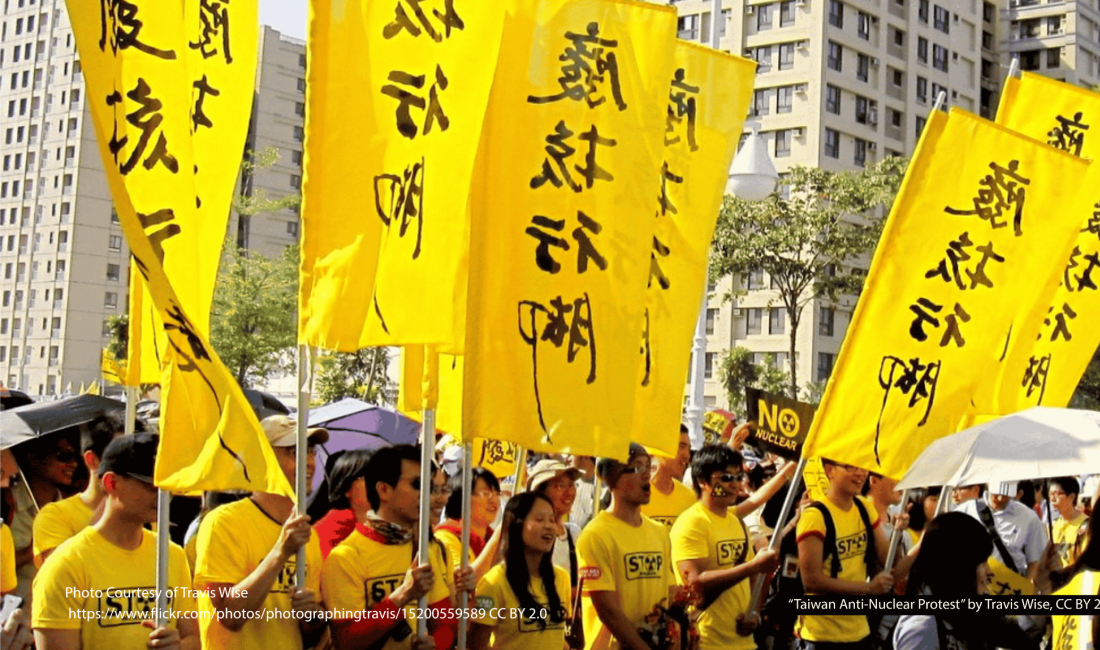Taiwan is preparing for a high-stakes national referendum this month amid rising geopolitical tension, domestic political confrontation and a growing tradition of citizen participation.
Here’s what you need to know.
The 2025 Referendum: Nuclear Power at the Ballot Box
On 23 August 2025, Taiwanese voters will decide on a referendum that asks:
“Do you agree that the Third Nuclear Power Plant (Maanshan) should continue operating, provided the competent authority confirms there are no safety concerns?”
At stake is Reactor No. 2 at the Maanshan Nuclear Power Plant, Taiwan’s last remaining nuclear reactor, which was officially shut down in May 2025 under the island’s decade-old nuclear phase-out policy. The referendum was introduced via the legislature by opposition parties—the Taiwan People’s Party (TPP) and Kuomintang (KMT)—rather than through a citizen-led initiative.
This makes it an Authority Referendum under the classification of the Direct Democracy Navigator.
Proponents argue that restarting the reactor would strengthen energy security and stabilise Taiwan’s power supply. Critics—including the ruling Democratic Progressive Party (DPP) and environmental groups—warn that the proposal undermines Taiwan’s long-standing nuclear-free homeland policy, shaped by the island’s seismic risks and unresolved nuclear waste challenges.
“Nuclear power has actually been one of the issues that inspired the development of referendum in Taiwan,” says Professor Yen-tu Su, democracy expert at the Academia Sinica. “Maybe more than 20 years ago, there was a movement calling for a referendum to decide on the fourth nuclear power plant in Taiwan that was under construction at the time. The anti-nuclear power people wanted to resort to direct democracy to stop that project and it never succeeded. But the twist is that, ironically, the first time when the nuclear power issue was on the ballot - in 2018 right after the reform of the Referendum Act - it was actually the pro-nuclear power people who managed to propose an initiative and they succeeded.”
The phrasing of this year’s referendum has drawn criticism. The ballot question includes the qualifier “provided the competent authority confirms there are no safety concerns”. Critics have labelled this conditional language as problematic.
“Because it’s an old reactor, to restart it, they actually need to go through a licencing process,” Su explains. “And there's just no guarantee that it will get the licence from the regulatory agency. Because of that people can’t really know what the yes vote means.”
Struggles over Constitutional Questions
Taiwan’s Referendum Act was significantly reformed in 2017 and again in 2019, making it easier for citizens to propose legislation. With each referendum cycle, new legal questions emerge—especially when propositions touch on constitutional matters or the separation of powers.
Earlier this year, the Central Election Commission (CEC) rejected a second KMT-backed proposal to hold a referendum on relaxing regulations on capital punishment.
“Last year our Constitutional Court actually made an important judgment restricting the use of death penalty,” Yen-tu Su says. “But the KMT submitted a second proposition for the referendum to counter this ruling. This proposition was rejected by the CEC, because the CEC thought that it would violate the Constitution.”
This was not unprecedented. In 2018, a citizen initiative to abolish a constitutional interpretation allowing same-sex marriage made it to the ballot.
“In 2016, the Constitutional Court had made a landmark ruling allowing same-sex marriage. People who were against this wanted to overrule it through referendum. At that time, the CEC decided that the referendum proposition can be interpreted as not being a direct challenge to the constitutional court's ruling. And the referendum proceeded. So you can say that in essence, the CEC would exercise some kind of pre-election review, especially when it concerns constitutional issues.”
The Liberalisation of the Referendum Act
Direct democracy has become a key feature of Taiwan’s democratic life. Citizens can propose national referenda by first collecting signatures from 0.01% of the electorate, followed by 1.5% to qualify for the ballot. Approved votes are held every two years, on the fourth Saturday in August.
Since legalising referenda in 2003, Taiwan has held several national votes that reflect its evolving democratic identity. The first, in 2004, linked to cross-Strait tensions, failed due to restrictive turnout thresholds. Major reforms in 2017–2019 lowered signature and participation requirements, sparking a wave of civic activity. In 2018, ten referenda were held alongside local elections, with seven passing—including those on nuclear energy, food safety and same-sex marriage—though some were later overturned or superseded.
In 2021, four referenda on issues like US pork imports and nuclear energy were all rejected, largely due to low turnout. A 2022 referendum to lower the voting age to 18 passed by majority but failed to meet the 50% threshold required for constitutional change.
“A large part of the reason why there are fewer and fewer referendums in the recent years is because we actually changed the rule again right after 2018,” Yen-tu Su explains. “Many people think the 2018 experience was not that successful, because there were long lines and people did not really have the time to fully deliberate all the issues and the concurrent elections. So in 2019 we actually revised the Referendums Act again and the main objective was to separate referendums from ordinary elections. From then on, the referendums are only held in odd years and all the nationwide elections are held in even years. The decoupling of referendums and elections certainly affected the incentives for especially politicians to propose referendums.”
“Now, to pass the referendums, in addition to have more yes-votes than no-votes, the yes-vote would have to exceed more than 25% of the whole electorate. And that certainly is an important factor. Because without the combination of nationwide elections, many people think that the turnout will be an issue,” said Yen-tu Su.
Political Polarisation, Security Anxiety and the Recall
This referendum is taking place amid heightened political and security tensions. Taiwan’s energy policy, military preparedness and democratic integrity are all under scrutiny, with China increasing military pressure and internal divisions deepening.
The KMT—traditionally seen as more China-friendly and critical of DPP energy policy—has launched the nuclear referendum as a way to challenge what it sees as ideological governance. Their argument ties together energy security and geopolitical resilience.
Aside from constitutional, authority and citizens-initiated referenda, Taiwan also allows for recall elections of lawmakers. Citizens must gather signatures from 10% of eligible district voters to trigger a vote. Recalls succeed if “yes” votes exceed “no” and reach 25% of all registered voters.
Earlier this summer, Taiwan experienced an unprecedented wave of recall campaigns targeting over two dozen KMT lawmakers, mayors, and councillors. These efforts, dubbed the “Great Recall”, were driven by civil society groups and supported by DPP-leaning activists. They accused the KMT of undermining national security, obstructing government reforms, and aligning too closely with Chinese interests.
Although the 24 recall votes held in July failed to meet the legal threshold, the campaign exposed deep public dissatisfaction and highlighted how recall votes—intended as democratic safety valves—can become partisan battlegrounds. Seven districts will still face recall votes in late August.
“This upcoming referendum is quite unique in the sense that it was not proposed by citizens through the initiative process, but by the opposition-controlled legislature,” said Professor Yen-tu Su.
“And the main reason they want to hold a referendum is as a countermeasure against the recall movement. Because they were afraid that many recall elections would have been scheduled in late August, they thought that with the referendum on the ballot, it would be easier to mobilise their supporters.”
Direct Democracy in Taiwan: Recent, But Rooted in Resistance
Taiwan’s vibrant system of direct democracy—embodied in national referenda and recall votes—is deeply rooted in the island’s historical struggle against authoritarian rule during the era of the White Terror. From 1947 to 1987, under Kuomintang (KMT) martial law, civil liberties were suppressed, dissent was brutally punished, and the public had no legal means to participate in national decision-making. The transition to democracy after the lifting of martial law marked a profound break from this past, and the gradual introduction—and later liberalisation—of referendum and recall laws has come to symbolise Taiwan’s determination to never return to authoritarianism.
These democratic tools are more than policy mechanisms; they are instruments of historical reckoning, allowing citizens to exercise political agency once denied. The ability to recall legislators or vote directly on nuclear policy, for example, is often framed as a generational response to decades of silencing and fear. While critics today debate the strategic use of referenda and recalls, particularly in partisan contexts like the 2025 "Great Recall" campaign, their very existence represents Taiwan’s ongoing commitment to participatory democracy and a constitutional order forged in memory of repression.
While Taiwan remains one of Asia’s most vibrant laboratories for direct democracy, uniquely combining representative institutions with regular opportunities for citizen-initiated lawmaking and oversight, challenges remain.
“Currently, we actually have a proposition that is collecting signatures on the Constitutional Court Act that our legislator passed earlier this year. At present, our constitutional court is essentially paralysed due to that legislation. And so people want to repeal it,” Yen-tu Su said.
“They have to collect maybe 300,000 signatures in six months. And this time they are trying to use the e-signature system. So they can collect signatures mainly online. But the problem is that if they get enough signatures, the proposition will still have to be voted two years from now, in 2027, on the fixed referendum day. So many people think, well, it's a long shot.”
Nevertheless, in a time of global democratic backsliding, Taiwan’s embrace of public participation offers both inspiration and lessons.




